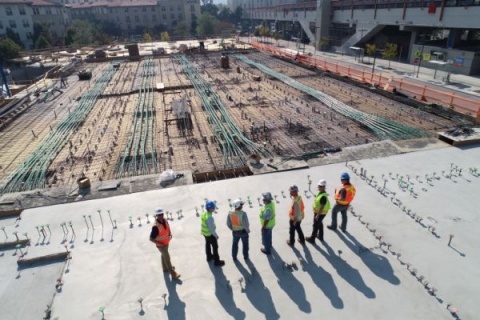

A new report developed by Crowe in conjunction with the University, shows that construction has a corruption problem on a scale that outstrips many other sectors
22 October 2021
5 min read
Fraud and corruption in the construction sector is destroying both profitability and public trust in infrastructure projects, according to new research from the University of Portsmouth.
A new report, Fraud and Corruption in the Construction Sector, developed by national audit, tax, advisory and risk firm, Crowe in conjunction with the University’s Centre for Cybercrime and Economic Crime, shows that construction has a corruption problem on a scale that outstrips many other sectors.
Such fraudulent activity allows public funds to be diverted from their purpose, meaning that taxpayers don’t get value for money. The profitability of legitimate construction companies is also eroded, while dishonest individuals and organised crime groups prosper.
Our research shows that the procurement of major construction projects is fraught with fraud and corruption risks.
Professor Mark Button, Director of the Centre for Cybercrime and Economic Crime
The report examines the unique structural and cultural factors that make fraud and corruption in construction a particularly high risk. Using real examples from past projects in the UK and comparable projects abroad to uncover the extent of fraud losses, it assesses and recommends potential routes forward for the government to better safeguard construction expenditure.
The report identifies the following factors that make the construction sector susceptible to fraud and corruption:
- Political and public pressure on projects – the job must be done
- Lack of standardisation – no two projects are the same
- Delays and overruns – unforeseen challenges can be exploited
- Complex supply chains – many players and moving parts
- Bid structuring – lowest bid award prompts profit to be sought elsewhere
- Large costs – obscuring fraud and waste
- Tough to scrutinise – quality of work can be concealed
- Local autonomy – providing opportunities for leakage
- Project management – inadequate supervision
- Project location – remoteness difficulties
- Regulatory burdens – red tape bureaucracy
- Construction culture – corruption, bribes and cartel behaviour more common versus other sectors
These factors contribute to a large ‘grey zone’ which makes fraud and corruption difficult to identify, measure and mitigate. The complexity of construction and procurement, and the need for projects to pivot based on unforeseen challenges, mean that it is hard to distinguish whether high costs are legitimate, criminal fraud or non-criminal waste and mismanagement.
Within the categories outlined above, different forms of fraudulent activity can arise. From collusion and bribery in the bidding process, or due diligence fraud in the construction phase, through to invoice fraud (false invoicing, overcharging), use of ‘ghost’, unqualified or illegal employees, direct theft of assets, and even extortion and racketeering, opportunities for fraudsters abound.
Construction has become a building site for fraud and corruption. Without solid foundations being put in place to counter this threat, taxpayer money risks being wasted and public trust in government spending will crumble
Jim Gee, Head of Forensic and Counter Fraud Services at Crowe
This is a pivotal moment as the UK economy emerges from the COVID-19 pandemic and the government continues to invest heavily in infrastructure, pledging in March 2020 to spend £600 billion on projects over a five-year period. Alongside these commitments, high profile and large-scale projects such as the HS2 rail line continue to be developed.
Professor Mark Button, Director of the Centre for Cybercrime and Economic Crime, said: “Our research shows that the procurement of major construction projects is fraught with fraud and corruption risks. As the government embarks on welcome major projects they must be careful to ensure the appropriate strategies are in place to protect public monies.”
A purely regulatory or law enforcement approach will mean that fraud is only dealt with once it has already occurred. A proactive and preventative approach is needed. Audit is also part of the solution, but the retrospective nature of audit, and its focus on individual organisations rather than across an entire project network, means it is insufficient on its own.
At a time when the UK government is investing heavily in infrastructure projects, the risk of public funds being misused is high.
Jim Gee, Head of Forensic and Counter Fraud Services at Crowe
Integrity Monitors, such as those used in the US, present an interesting option by combining investigative, accounting and construction-related skills. Their ability to oversee a project from inception to completion makes them a powerful tool for reducing opportunities for fraud, as well as identifying them when they do arise.
Jim Gee, Head of Forensic and Counter Fraud Services at Crowe, said: “Construction has become a building site for fraud and corruption. Without solid foundations being put in place to counter this threat, taxpayer money risks being wasted and public trust in government spending will crumble.
“At a time when the UK government is investing heavily in infrastructure projects, the risk of public funds being misused is high. We need to learn from the experience of the United States. Setting aside a minimum percentage of construction project budgets to establish an Integrity Monitor function would be a justifiable cost, far outweighed by the potential price of unchecked fraud and corruption.”
